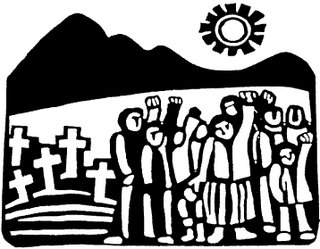the observer effect is good theology
In physics, the observer effect (often mistaken for Heisenberg's Uncertainty Principle) points to the fact that the very act of observation has a direct effect on that which is being observed, meaning that true objectivity is impossible. For instance, when viewing something in a microscope (which requires the use of light), the object being observed will be affected by the light radiation, even if on a sub-atomic level.
Drawing this principle out further, we can conclude that one cannot exist in the world without somehow (and continuously) affecting that world. To exist is to affect.
What does this mean for theology?
I would argue (and I'm drawing on concepts promulgated by one of my teachers, Dr. Jim Perkinson, among others) that religious fundamentalism -- and, specifically, biblical literalism -- is impossible given the observer effect. One cannot read the Bible objectively and draw from the Bible objective principles. Instead, biblical study is always a subjective process, with the individual reader always bringing to the study her/his own criterion by which s/he interprets what is read.
This is a very liberating concept, for it frees us into the realization that God's revelation is always a dialogical process. In other words, the Word of God, though it may exist on its own (which cannot be proven or disproven), cannot be discovered and understood without us first affecting it through the lens of our experience (which explains why there is such a large difference in people's understanding of the Word of God -- from those, like Christopher Columbus, using God to justify the genocide of Native Americans to those, like Gandhi, using God to inform a nonviolent movement against British colonialism).
The task for us, then, is to recognize that we cannot help but affect God's revelation and that we have a responsibility to seriously engage in dialogue with God (and with each other) in determining how that revelation will come into being.
If I understand God to be Love, then I will recognize God revealing God's self in acts of love, and I will demonstrate my acceptance of that revelation and that understanding of God by reciprocating love. In the end then, my loving further reveals a loving God.
On the other hand, if I understand God to be vengeful, I will recognize God as the instigator of natural disasters and war and famine and disease, and I will demonstrate my acceptance of that revelation by acting in ways that pronounce vengence. My vengence, in turn, will serve to reveal a vengeful god.
Drawing this principle out further, we can conclude that one cannot exist in the world without somehow (and continuously) affecting that world. To exist is to affect.
What does this mean for theology?
I would argue (and I'm drawing on concepts promulgated by one of my teachers, Dr. Jim Perkinson, among others) that religious fundamentalism -- and, specifically, biblical literalism -- is impossible given the observer effect. One cannot read the Bible objectively and draw from the Bible objective principles. Instead, biblical study is always a subjective process, with the individual reader always bringing to the study her/his own criterion by which s/he interprets what is read.
This is a very liberating concept, for it frees us into the realization that God's revelation is always a dialogical process. In other words, the Word of God, though it may exist on its own (which cannot be proven or disproven), cannot be discovered and understood without us first affecting it through the lens of our experience (which explains why there is such a large difference in people's understanding of the Word of God -- from those, like Christopher Columbus, using God to justify the genocide of Native Americans to those, like Gandhi, using God to inform a nonviolent movement against British colonialism).
The task for us, then, is to recognize that we cannot help but affect God's revelation and that we have a responsibility to seriously engage in dialogue with God (and with each other) in determining how that revelation will come into being.
If I understand God to be Love, then I will recognize God revealing God's self in acts of love, and I will demonstrate my acceptance of that revelation and that understanding of God by reciprocating love. In the end then, my loving further reveals a loving God.
On the other hand, if I understand God to be vengeful, I will recognize God as the instigator of natural disasters and war and famine and disease, and I will demonstrate my acceptance of that revelation by acting in ways that pronounce vengence. My vengence, in turn, will serve to reveal a vengeful god.


